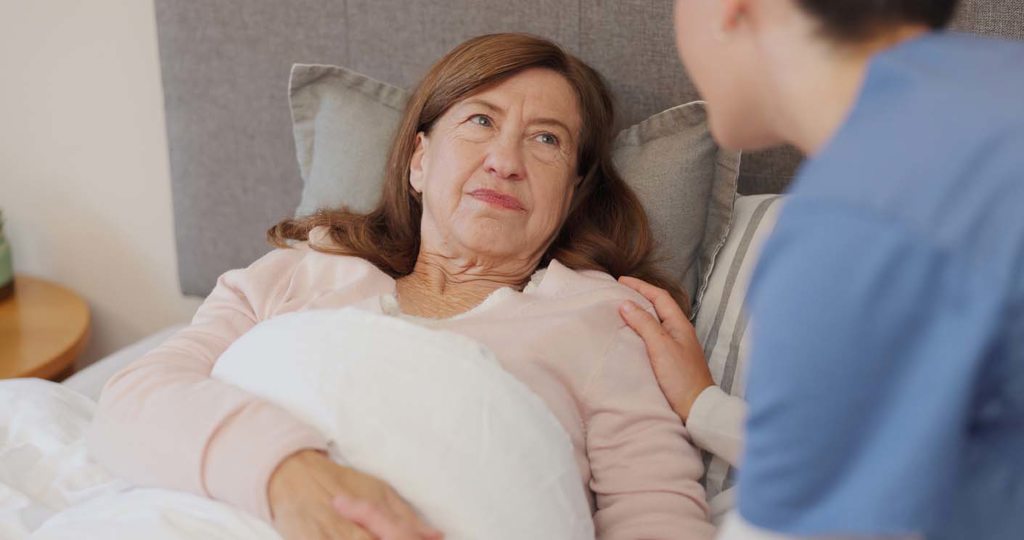The Facts About Hospice Care

Has someone in your life ever needed hospice care? This type of medical care is often recommended when people have life-limiting illnesses, including cancer, heart and lung disease, Alzheimer’s, ALS and other neurological diseases.
“In near end-of-life cases, hospice care is often chosen to give a person the best quality of life,” said Cheryl A. Mitchell, BSN, RN, Director of Penn Highlands Healthcare at Home. “Rather than treating the person’s illness in hopes of recovery, hospice care provides comfort, dignity and quality to a person in their last six months of life.”
How do you determine when hospice care is needed?
A patient doesn’t have to be elderly, have cancer, be bed bound or critically ill to use hospice home care services. Patients of any age need to meet only two criteria to be eligible for hospice care:
- A physician must certify that the patient is terminally ill.
- If the illness runs its normal course, life expectancy is six months or less.
Many people think hospice care can only be provided in the final days of a person’s life. In fact, a person can receive hospice care once their doctor has certified that they have six months or less to live. Many families who have used hospice say later that they wish they had elected to use it earlier.
The main benefit of electing hospice care early is to provide a comfort care plan, including pain and symptom management, which helps patients have a better quality of life. Hospice does not prolong life or hasten death, but rather focuses on improving the quality of life for terminally ill patients.
Studies indicate that patients in hospice care often live longer than those who do not receive it because of factors like better pain and symptom management and avoiding risks associated with aggressive, curative treatments. Hospice care provides a team-based approach to physical, emotional, and spiritual support for both the patient and their family, which can lead to unexpected longevity and improved well-being. Hospice care can help a person get the most out of their final months. Patients may use this time to check items off a life-long bucket list, spend time with family members and friends, prepare advance directives and outline their final wishes.
What type of support does hospice care offer?
Hospice care can be provided to patients in their own homes, family members’ homes, skilled nursing facilities and assisted living facilities. The hospice team works closely with the patient’s physician to design a plan to assess, monitor and manage symptoms to provide the highest quality of life in a patient’s final months, weeks, and days.
Hospice professionals support loved ones and caregivers by teaching them what to expect throughout the end-of-life journey, the best way to provide care and how to care for themselves during this time. Often, the most beneficial thing hospice teams bring is reassurance to family members that they are caring for their loved one correctly and that their loved one is comfortable.
Most hospice teams are available 24 hours a day, every day of the year. Each patient and their family are provided with the services they need, which may include:
- Medications to manage pain and symptoms, which improve comfort and maintain quality of life
- Emotional support and, if desired, professional counseling to help patients and family members process emotions and resolve issues to find peace and closure
- Spiritual resources that honor the patient’s traditions and beliefs and guide the patient and family through the last stages of life
- Assistance with identifying resources to help with financial, food, transportation and other social support needs
- Support and guidance in managing the practical details of caring for a dying loved one
Is there a cost?
Medicaid and most private insurance plans have a hospice benefit that covers nearly all of the costs of care and services, including visits, medications, supplies and equipment related to the diagnosis.
Who provides the care?
A hospice care team is made up of many types of medical and support service professionals as well as dedicated volunteers that can include:
- Physicians
- Hospice nurses
- Physical, speech and occupational therapists
- Hospice aides to assist with personal care and comfort measures
- Social workers who help with financial concerns and identifying resources
- A pastoral care team and Spiritual counselor who can help with spiritual well-being
- Bereavement support who provide resources, education for up to 12 months after the death of their loved one
- Volunteers who visit patients to provide assistance, companionship and respite for caregivers
Penn Highlands Healthcare at Home offers loving, compassionate and committed hospice care to patients and their loved ones. The multidisciplinary Penn Highlands Hospice Care team includes many types of medical and support service professionals as well as dedicated volunteers. All members of the team are professionally trained in the care and support of patients during the end-of-life period. To learn more about Penn Highlands Hospice services, visit www.phhealthcare.org/hospice or call 1-800-841-9397.
